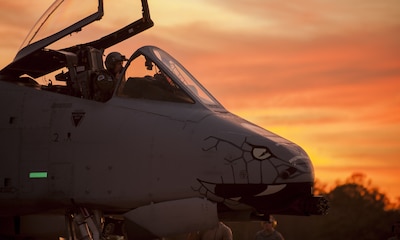By Air Force Staff Sgt. William Hopper, 122nd Fighter Wing
FORT WAYNE, Ind., Feb. 14, 2018 — The Indiana Air National
Guard’s 122nd Fighter Wing recently completed Operation Guardian Blitz during a
two-week joint training exercise at MacDill Air Force Base, Florida, which
included air-to-air refueling, training alongside Navy rotary assets and joint
terminal attack controllers.
The team of over 200 airmen and 10 A-10C Thunderbolt II
aircraft were able to take advantage of the favorable weather conditions and
ability to work with other units at MacDill, and were afforded opportunities to
practice close air support, forward air control and combat search and rescue.
Unique Training Opportunity
“My favorite part of training here at MacDill has been the
combined force training operations that we don’t have an opportunity to do at
home,” said Air Force Lt. Col. Joshua Waggoner, the 122nd Fighter Wing
Operation Guardian Blitz detachment commander. “We are here training with our
A-10 aircraft, two Navy MH-60S helicopters and refueling tankers overhead.
During missions we are on station for over two hours integrating with all these
assets while also coordinating with [joint terminal attack controllers] on the
ground. The opportunity to work with these other agencies to accomplish
missions has been invaluable.”
Operation Guardian Blitz was unique in allowing different
branches and squadrons to integrate in a way not typically found during a joint
training exercise.
“The ability to have helicopters out of Virginia, tankers
out of Niagara, and A-10s out of Fort Wayne, all operating in the same sortie
and off the same ramp is something you usually don’t get elsewhere,” Waggoner
said. “Even at Snowbird or other trips in the past, we’ve never been collocated
with all our other assets. Here at MacDill for Guardian Blitz, we’re all
located in the same place and able to interact face-to-face on a daily basis.
It’s a luxury you just don’t get anywhere else.”
“We were able to match our objectives with the other unit’s
objectives to make it all happen at the same time,” he said. “This is by far
the most aggressive training schedule we have set, and it never would have been
able to happen at home this time of year due to weather and other
circumstances.”
Air Force Refueling
One of the many training opportunities made possible by
Guardian Blitz was the refueling mission completed by the Air Force Reserve’s
914th Air Refueling Wing from Niagara Falls, New York.
“The 914th ARW from Niagara is in the process of
transitioning from the C-130 [Hercules cargo planes] to KC-135 [Stratotanker
refueling] tankers,” Waggoner said. “They were excited to be a part of Guardian
Blitz because it gave them the opportunity to get in plenty of refueling
sorties with our A-10s while getting training from MacDill instructors. They
have completed 41 air-to-air refueling sorties in the last two weeks, which is
about what they usually fly in six months.”
“We just made the transition to the KC-135 from the C-130
about six months ago,” said Air Force Lt. Col. Chris Pfeil, a pilot with the
914th Air Refueling Wing. “It’s a little different than what we are used to.”
“Once we get a little more proficient with the KC-135 our
unit will become operational,” he said. “More and more, air-to-air refueling is
becoming in-demand to carry on the mission of the Air Force.”
Navy Search, Rescue
Also joining the training were two MH-60S Seahawk
helicopters operated by the Navy’s Helicopter Sea Combat Squadron 22, from
Naval Station Norfolk, Virginia. During missions, the HSC-22 provided recovery
assets for the search and rescue training and were also utilized for additional
close air support to strike targets on the ground.
“The MH-60S Seahawk is primarily used for search and rescue
operations and logistics,” said Navy Petty Officer 2nd Class Nicholas Glass, a
door gunner with HSC-22. “I am looking forward to working with other branches
of the military during Guardian Blitz to get a better idea of how we can work
together to improve mission success.”
“We train to the point that we can execute our mission in
any environment,” Waggoner said. “The time we put in training at places like
MacDill and back home in Fort Wayne really pays off when it comes time to
execute the mission.”

No comments:
Post a Comment